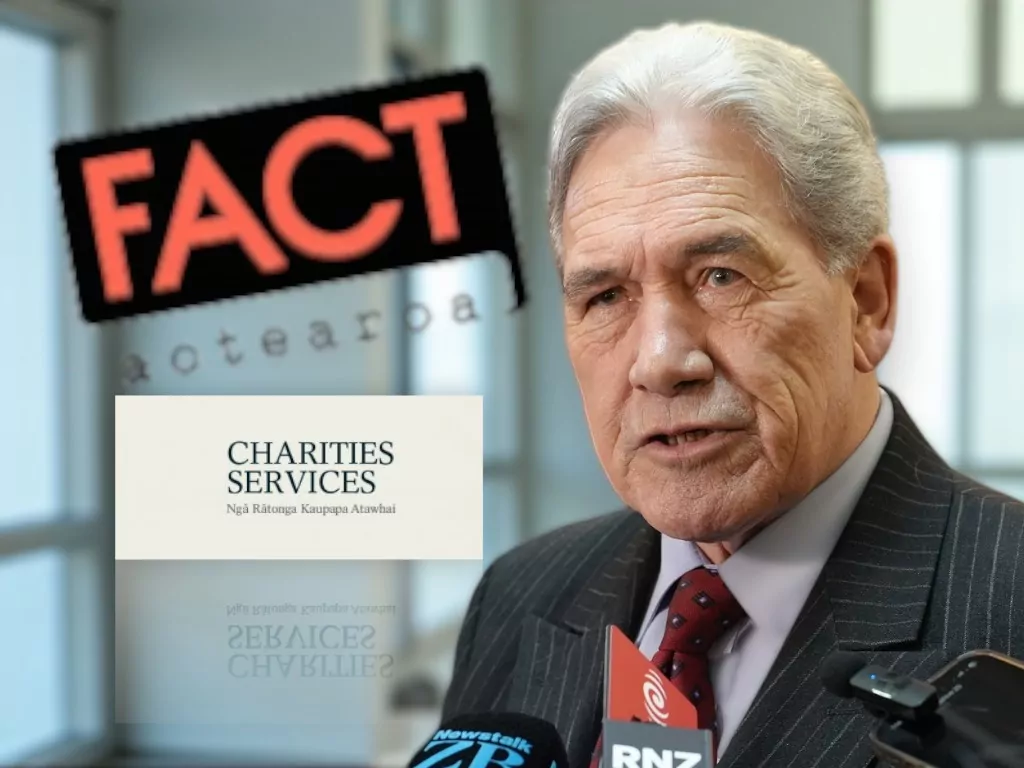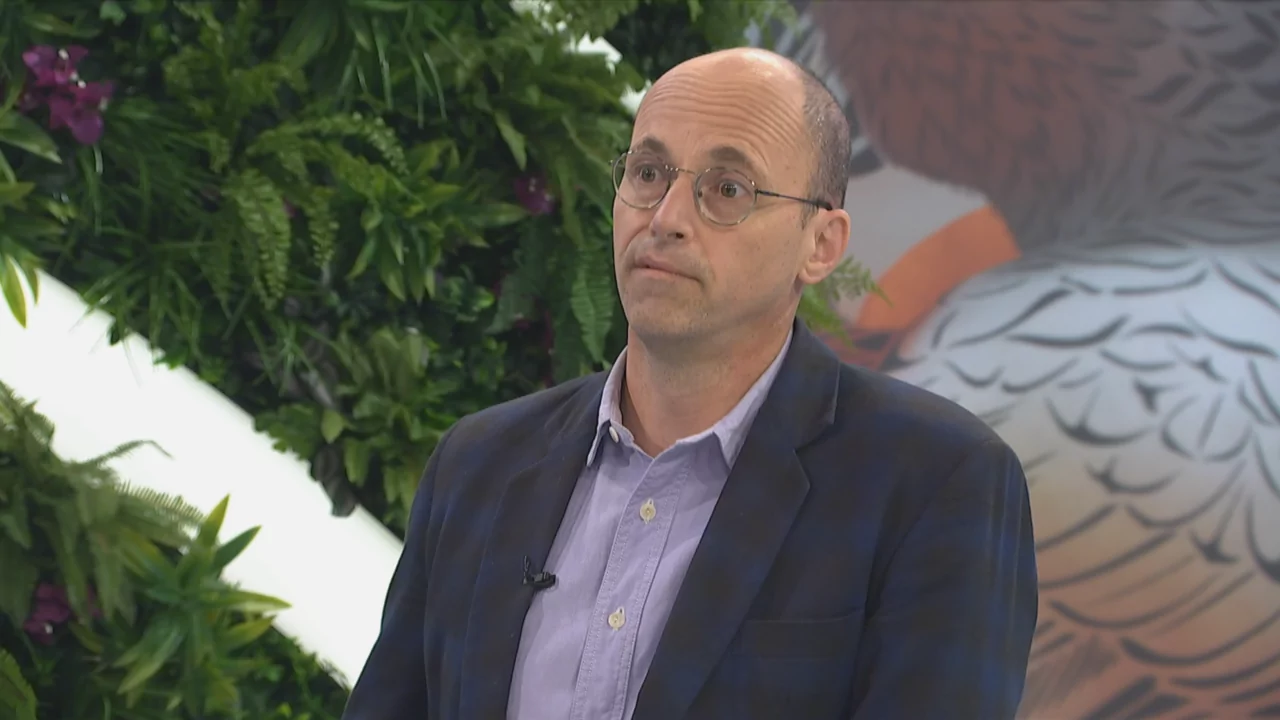Escaped youth tracked by Eagle helicopter, found hiding in New Brighton
The young person who escaped from a youth justice facility in Rolleston has been located...

New Zealand First Leader Winston Peters has called for answers over the taxpayer funding of FACT Aotearoa, now under scrutiny for potentially breaching the Charities Act by campaigning against the party during the election.
The Charities Commission confirmed to chrislynchmedia.com that it is reviewing the activities of the registered charity, following concerns the organisation may have breached rules by publicly opposing a political party while receiving $50,000 in taxpayer funding from the former Labour-led Government.
FACT Aotearoa, which describes itself as a grassroots movement countering misinformation, was awarded the funding in 2023 through the Department of the Prime Minister and Cabinet’s Countering and Preventing Violent Extremism Fund.
Six months earlier, InternetNZ gave the group $10,000 to “support operating costs so that FACT can do more of what they do during the critical election period, namely minimise the harms of misinformation by disrupting perpetrators, raising awareness, and pushing back with accurate information.”
On 9 October 2023, the group issued a press release titled “A Vote For NZ First Is A Vote For Conspiracy Theorists.”
Under New Zealand’s Charities Act 2005, registered charities are prohibited from promoting or opposing political parties. Their activities must align with charitable purposes such as education, relief of poverty, or advancing community welfare. FACT Aotearoa was registered as a charity on 8 March 2022.
New Zealand First leader Winston Peters told chrislynchmedia.com, “It is clear that there are some serious questions that need to be answered, not only by FACT, but by the previous government administration who funded this organisation with such obvious concerns.
“It is astonishing that a taxpayer funded organisation has been allowed to seemingly actively campaign against the sitting government’s political opponent during a general election,” Peters said.
“What is appalling is the delay in action from the relevant authorities. It is unacceptable that it has taken so long to register that FACT is clearly breaking the Charities Act in such a blatant and demonstrable fashion over such a long period of time.”
A spokesperson from the Department of the Prime Minister and Cabinet said “the Preventing and Countering Violent Extremism fund was a three-year fund that ended in 2024/25.
“It funded over 40 projects to support community and civil society organisations to deliver programmes which counter and build resilience to violent extremism and radicalisation.
The Fund is administered by the Department of Internal Affairs (DIA). Funding decisions are made by DIA based on recommendations from an interagency panel of subject matter experts” The spokesperson from the Department of the Prime Minister and Cabinet said.
“In the early funding rounds, applications were heavily weighted towards community-led initiatives with an emphasis on countering messages of hate, building societal resilience, and raising awareness of radicalisation to violent extremism. FACT Aotearoa was a first-year fund recipient.”
Lawyer Sue Barker, director of Sue Barker Charities Law, said the legal framework governing charities is clear, and FACT Aotearoa’s actions were “close to the line”.
“Charities may not support or oppose a particular political party or candidate for public office. Otherwise, in my view, they should be able to advocate fearlessly for their charitable purposes. Charities can and should be ‘political’, they just can’t be partisan.”
Barker said if FACT Aotearoa is advocating for its charitable purposes, and not for or against a specific political party, it should not be in breach of charities law. However, she acknowledged the group’s actions could still attract complaints.
“If [FACT] is advocating for their charitable purposes, as opposed to advocating for or against a particular political party, they should not be in breach of charities law, although they might make themselves vulnerable to complaints from people who disagree with their views, as we’ve seen in the ‘culture wars’ in the UK.
“This, in my view, is where charities require protection, wherever they fit on the political spectrum.”
Barker also criticised what she called increasing legal uncertainty following the Supreme Court’s decision to deregister Family First.
“The law in New Zealand has become very confused, particularly following the Supreme Court decision in Family First, which saw them deregistered not because they had done anything ‘wrong’ under charities law, but essentially because the decision-maker happened to disagree with their views.
“I am on record as saying that, with great respect to the Supreme Court, that is a very dangerous position for a liberal democracy to be in. We can’t have a system where eligibility for charitable registration changes every three years depending on which political party is in government.”
On FACT Aotearoa’s criticism of New Zealand First, Barker said the comments may fall into a legal grey area.
“Arguably this advocacy is in furtherance of its purposes, but the difficulty is the specific mention of New Zealand First and specific politicians,” she said.
“It is nowhere near as blatant as the active financial support of Te Pāti Māori and John Tamihere’s mayoral campaign that was undertaken by Te Wairarapa. In this case, they seem more focused on raising awareness of issues they’re concerned about rather than specifically encouraging people not to vote for NZ First. But I accept it’s close to the line.
“The law is so unclear, and the line so fuzzy, that many charities (with the possible exception of this one) are choosing to self-censor to the point that our democracy is being harmed by the chilling effect caused by the Family First decision.”
“Provided a charity is advocating for its charitable purposes, not breaking the law, not inciting violence, and is otherwise acting in accordance with its rules, in my view charities should be protected from state intervention in their advocacy, even if the state disagrees with their views.”
FACT Aotearoa launched an “education-focused project” in November 2023 in response to misinformation and conspiracy theories. But concerns were raised that the group instead promoted ideological messaging and directly attacked political figures.
Last week, its current spokeswoman Jacinta O’Reilly told the Royal Commission of Inquiry that the group didn’t have the capacity to continue its taxpayer-funded project and returned most of the money.

FACT member Jacinta O’Reily, speaking at the Royal Commission of Inquiry into the Government’s handling of COVID-19.
Taxpayers’ Union head of community Tory Relf said it was concerning that a registered charity receiving public funding under the guise of education appeared to cross into partisan campaigning.
“Regardless of ideology, this is a clear breach of public trust,” Relf said. “Government funding must remain politically neutral, and we urge Charities Services to investigate whether FACT Aotearoa has violated the Charities Act.”
Free Speech Union CEO Jonathan Ayling said his organisation doesn’t take a position on FACT’s charity status, but said government-funded organisations must maintain neutrality.
“FACT Aotearoa will not achieve its goals by taking sides. It was funded with the intent of combating misinformation, but organisations like this favour censorship over debate. Censorship gets us nowhere.”
While FACT Aotearoa claims to have no party affiliation, its leadership and membership have close ties to left-wing political activism.
Jacinta O’Reilly served as the Christchurch East Greens convenor in 2023. Byron Clark, a self-described alt-right extremism researcher, previously stood for the Anti-Capitalist Alliance and the Workers Party of New Zealand. Stephen Judd, Chair of InternetNZ and a long-time Labour activist, was a trustee of FACT Aotearoa and appeared as its spokesperson on TVNZ’s Breakfast. Lyttelton writer Anke Richter, another co-founder, is also the founder of Decult and has previously voiced her trust in mainstream media.

Byron Clark, a self-described “alt-right extremism” researcher.

Anke Richter, a co-founder of FACT

Stephen Judd, Chairperson of Internet NZ
Their involvement has prompted criticism that FACT Aotearoa operates not as a neutral educational organisation but as a politically motivated group targeting dissenting views.
Last week, RNZ reported on FACT’s participation in a discussion on pandemic misinformation, quoting O’Reilly saying, “There’s lots of stuff about how advertising works to change people’s minds.” RNZ did not disclose her political background.
Minister for the Community and Voluntary Sector Louise Upston, who oversees the Charities Commission, said she could not comment on individual entities. “Specific complaints or enquiries can be directed to the Department of Internal Affairs via Charities Services,” she said.
Charities Services Director Charlotte Stanley confirmed the agency had previously reviewed FACT Aotearoa’s advocacy and found no grounds for action at the time. However, “we are now looking into whether the specific matters you have raised are in breach of the Charities Act 2005,” she told chrislynchmedia.com.
Stanley said charities may support a particular policy if it aligns with their charitable purpose, but must not support or oppose a political party or candidate.
Barrister David McLay said the law allows some non-charitable purposes only if they are “ancillary” to charitable purposes. “A one-off statement opposing a political party is not likely to breach the Charities Act. But a fulsome political campaign is inherently antithetical to what a charity can legitimately do.”
FACT Aotearoa Current Spokeswoman Jacinta O’Reilly said the organisation was unable to meet Chris Lynch Media’s deadline. “I have done all I could to get a FACT response sorted, but one day is really not long enough to manage a response and check with everyone. Some of our people don’t log on every day and most of us have work, families and other stuff slowing us down.”


